HAMLYN - College of Social Sciences and International Studies ...
HAMLYN - College of Social Sciences and International Studies ...
HAMLYN - College of Social Sciences and International Studies ...
Create successful ePaper yourself
Turn your PDF publications into a flip-book with our unique Google optimized e-Paper software.
Criminal Justice<br />
foundation <strong>of</strong> our system. It is drawn at r<strong>and</strong>om from the lawabiding<br />
inhabitants <strong>of</strong> the locality in which a case is tried. We must<br />
on no account introduce measures which allow the state to start<br />
nibbling away at the principle <strong>of</strong> r<strong>and</strong>om selection <strong>of</strong> jurors".<br />
Jurors must not be seen, he said, as "representing the views <strong>of</strong><br />
the community, or <strong>of</strong> discrete parts <strong>of</strong> it, nor indeed <strong>of</strong> representing<br />
either the complainant or the victim". 39 On reflection, I<br />
think that on this issue Lord Taylor was right <strong>and</strong> the Royal<br />
Commission wrong.<br />
I have always been a strong supporter <strong>of</strong> the jury system as<br />
incomparably the best known way <strong>of</strong> dealing with serious cases.<br />
Sometimes, admittedly, the jury gives a truly perverse verdict—<br />
one not only contrary to the evidence <strong>and</strong> the law but which is<br />
inexplicable even in terms <strong>of</strong> what is sometimes called jury<br />
equity. However, such cases seem to be very rare. Research<br />
suggests that generally the jury's verdict is explicable in light <strong>of</strong><br />
the evidence, 40 <strong>and</strong> when it is not it usually seems to represent<br />
the jury reaction to what it considers to be an unjust law, an<br />
unfair prosecution or the threat <strong>of</strong> an excessive penalty. The<br />
jury's capacity to do justice in defiance <strong>of</strong> the law, as in the case<br />
<strong>of</strong> Clive Pontdng, has been part <strong>of</strong> its historic role over the<br />
centuries 41 <strong>and</strong> we would be poorer without it.<br />
There is as yet no right <strong>of</strong> appeal by the prosecution against a<br />
jury acquittal save in the rare situation where it can be established<br />
that the acquittal was probably the result <strong>of</strong> intimidation<br />
or other form <strong>of</strong> jury nobbling for which someone has been<br />
convicted. 42 Recently, however, the Law Commission has proposed,<br />
in the aftermath <strong>of</strong> the Stephen Lawrence case, that in<br />
certain circumstances a second trial should be allowed. The<br />
<strong>of</strong>fence would have to be punishable with three or more years<br />
<strong>of</strong> imprisonment; the new evidence would have to strengthen<br />
39 The Times, July 1, 1995.<br />
40 See J. Vennard, "The Outcome <strong>of</strong> Contested Trials" in Managing Criminal<br />
Justice (D. Moxon ed., 1985), pp. 126-151; <strong>and</strong> "Evidence <strong>and</strong> Outcome: A<br />
Comparison <strong>of</strong> Contested Trials in Magistrates' Courts <strong>and</strong> the Crown Court",<br />
Home Office Research <strong>and</strong> Planning Unit, Research Bulletin (No. 20, 1986),<br />
p. 48.<br />
41 For research that traces that role see T.A. Green, Verdict According to<br />
Conscience: Perspectives on the English Criminal Trial, 1200-1800 (Chicago<br />
University Press, 1985).<br />
42 This exception was introduced by the Criminal Procedure <strong>and</strong> Investigations<br />
Act 1996, s. 54.<br />
62

















